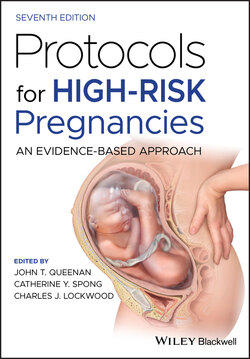Читать книгу Protocols for High-Risk Pregnancies - Группа авторов - Страница 128
Macrocytic anemia
ОглавлениеFigure 11.1 shows the appropriate work‐up for the search of causes in the presence of macrocytic anemia. Vitamin B12 deficiency is rare, as most healthy individuals have 2–3 years’ storage available in the liver. However, vitamin B12 deficiency can be encountered in individuals who have undergone bariatric surgery with partial gastric resection and are noncompliant with recommended vitamin B12 supplementation (350 μg/day sublingually plus 1000 μg IM every three months if needed), in individuals with pernicious anemia (an extremely uncommon autoimmune disease in women of reproductive age which is diagnosed by the presence of serum intrinsic factor antibodies), and in those with malabsorption (e.g., Crohn disease or ileal resection). Folate deficiency is less common today given the supplementation of foods with folate and universal folic acid supplementation in pregnancy. Recommended folate requirements are 400 μg/day during pregnancy, with higher doses recommended in the presence of multiple gestations, hemolytic disorders such as sickle cell anemia or thalassemia, and in patients taking antiepileptic drugs (AED) or sulfa drugs (e.g., sulfasalazine). In addition to macrocytic anemia, folate deficiency may also cause thrombocytopenia.
Figure 11.1 Causes of maternal anemia, classified by mean corpuscular volume (MCV).
If a diagnosis of folate deficiency is made, or the woman had a prior pregnancy affected by a neural tube defect, the recommended dose of folic acid is 4 mg/day. Anemia due to folate or B12 deficiency should respond briskly, with an elevated reticulocyte count, within 4–7 days of beginning treatment. In the case of macrocytic anemia with normal folate and vitamin B12 levels, a consultation with a hematologist is indicated for bone marrow biopsy.
